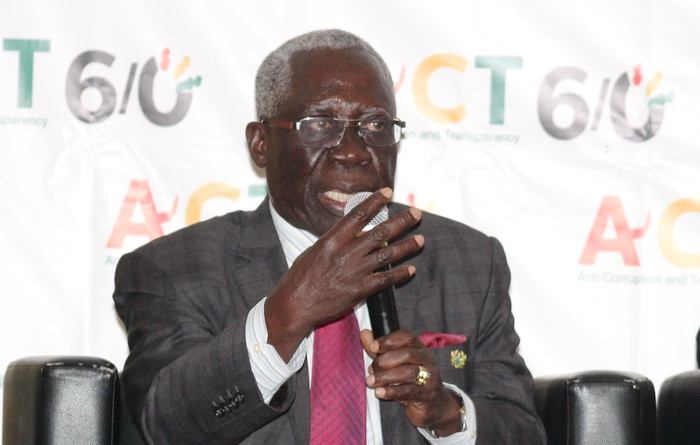The government is not in a hurry to prosecute individuals or institutions perceived to be corrupt until thorough investigations have been carried out and the necessary evidence secured, the Senior Minister, Mr Yaw Osafo-Maafo, has said.
He said although the government was determined to properly address corruption, especially within the public sector, it would not be forced to rush through the process else innocent people might be punished for no offence.
Mr Osafo-Maafo made the remarks at the launch of this year’s National Anti-Corruption and Transparency Week in Accra on Monday.
The one-week event is being organised by the Commission on Human Rights and Administrative Justice (CHRAJ), in collaboration with a number of anti-graft agencies and institutions, both in the public and the private sectors.
Panellists at the event included the United States Ambassador to Ghana, Mr Robert Jackson, a Senior Fellow of the Institute of Economic Affairs (IEA), Professor John Asafo Adjei, and the Executive Director of the Private Enterprise Federation (PEF), Nana Osei Bonsu.
Read also: GH₵ 50,000 at stake in Aliu Mahama commemorative match
Gov’t more determined
Explaining the government’s commitment to fight corruption, Mr Osafo-Maafo indicated that it was imperative that the action to deal with corrupt officials or individuals was not taken carelessly, otherwise some people might be accused wrongly.
“Although some individuals have come out with reports of certain forms of corruption about certain people, we cannot rely on such information to prosecute them. We have to do our own investigations thoroughly first,” he said.
However, the Senior Minister said that would not slow down the process of dealing with corruption and stressed that such individuals or groups would be punished once the necessary evidence had been established.
“We will make corruption unattractive to sound a warning to people who plan to do it,” he added.
Outlining some of the ways to make the fight against corruption more meaningful, Mr Osafo-Maafo said the government had tasked the Ministry of Education to review the curriculum of schools to include the study of ethical values.
“We are going to start with our children so that as they grow, they will learn the ethical values of our culture and strive to live a disciplined life,” he explained.
CHRAJ
In his welcome address, the Commissioner for the GHRAJ, Mr Joseph Whittal, underscored the need for the nation to deal with corruption because it remained one of the most daunting development challenges confronting the country at the moment.
“Several studies and surveys in Ghana and elsewhere support the view that corruption is a major impediment to economic progress, social welfare, service delivery and good governance in Ghana and the African continent as a whole,” he said.
Mr Whittal said the payment of salaries to ghost names cost the country GH¢30 billion annually, adding that such monies could otherwise be channelled into other development needs.
He, therefore, stressed that conferences on corruption would help deal with the issue and called for a strong partnership between the public and private sectors to address the challenge.
Outlining some of the activities for this year’s event, Mr Whittal said CHRAJ and the Ghana Anti-Corruption Coalition (GACC) would organise regional dialogues on corruption.
“Ghana Integrity Initiative (GII) and CHRAJ would organise debates and quiz competitions on the subject of corruption among students of tertiary institutions,” he added.
During the discussion, the panellists stressed the need for stronger collaboration to deal with corruption.
They said the government needed to show more commitment to fighting corruption by punishing officials who had been cited for engaging in various corruption deals.

